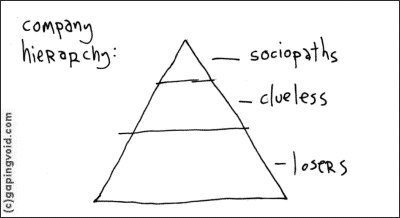
Hugh Macleod, somewhere on his Gaping Void blog, has this neat cartoon depicting the company hierarchy. It's a pyramid, naturally enough, and at the base are 'losers', in the middle are 'clueless' and at the top are 'sociopaths'. Fair enough, even if it's not totally fair. Perhaps it's only 95% fair ;-). And while Hugh labels the bottom layer 'losers', it seems to me that in this particular pyramid, everyone is a loser.
Dave Pollard's post, Living on the Edge, presents a diagram of a series of concentric circles - the outermost circle which comprises 10% of the population are the innovators on the edge, and the innermost circle which comprises just 1% of the population are the political and business elite. I suppose that if you had a conical pyramid instead of the usual square and looked at it from a hot-air balloon :-) both Hugh's and Dave's drawings might look similar. Not that I equate Dave's edge-dwellers with Hugh's losers!
There's another connection, too. Both Hugh and Dave have described systems - very sick systems, full of wicked problems: and full of people, too, including some wicked ones no doubt.
Today a thought popped into my head - just what do most companies do that actually adds real meaning to people's lives? When I talk to business owners, and when I talk to employees, I'm often struck by the similarity of the conversations. The really serious conversations, which don't happen so often because they are so scary, all seem to lead to 'meaning' ... like, "What does all this activity really mean?" or "Well, now I've made it, it just doesn't seem to mean what I thought it would". And the same inquiries could be made not just by individuals but also by entire systems, however defined; a team, a company or even a country.
Somehow I know that it doesn't matter how much training you have or take, how many 'change management' initiatives you introduce, or how many workshops, focus groups, seminars or Open Spaces you invoke, nothing makes much lasting difference, nothing sticks, without 'meaning'. It's tricky because 'meaning' doesn't get decided - - - it sort of arises, and I have a hunch that it does so individually AND collectively almost simultaneously because we are relational beings. (If it doesn't arise, then it's basically imposed, which is the cause of the lament of so many business owners that their employees just don't seem to get it - of course they don't ... it literally means nothing to them.)
Practically, what does it mean, say, for a company? I'm of the view that most strategic activity is basically what could be called sense-making. The best analogy I've heard is that it's making sense of a game where no one has told you the rules or how many players there are and the rules and the players keep changing all the time! Which is also about wicked problems.
Sense-making is only a stepping stone to meaning. Lots of people tend to equate the two but I think there's a big difference. The best way I know how to explain the difference is through what my father told me about death: "We may comprehend death, but we will never understand it" - sense-making is aligned with comprehension, but meaning is about understanding.
What's more, there's no sense in your making sense all alone - you have to communicate it to others, both to be affected by them and their perspectives and to test the reality of your sense-making. In a company those others are what I call a 'strategic team'. Teams really are the greatest strategic asset you have in a company, but most so-called teams have quite a way to go before they perform in this way. It's more than a functional or operational arrangement, which is where most teams seem to be.
It's the situation where you realise that without the team and the other people on the team, your life would somehow have less meaning even if only because being part of the team brings out the best in you, work-wise and personally. Now that's a tough call for the company, for the team and for the individuals. It's also a choice that involves paying as much attention to the process of the team as to getting the job done.

1 comment:
Great post, Alex, and one that addresses a very important topic. Fouro calls that sense making process the search for "revealed shared purpose", which I think sums things up nicely, don't you?
Post a Comment